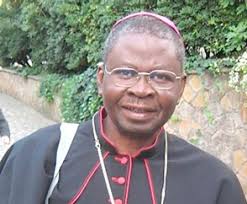Henceforth, there would be no handshakes during mass in Catholic Churches throughout the country as well as congregants receiving communion on their tongues as part of measures to guard against the spread of the deadly coronavirus.
The latest directive issued by the Ghana Catholic Bishop’s Conference sighted by MyNewsGh.com urges Ministers and Extraordinary Ministers of Holy Communion to wash their hands or use sanitizer before and after the distribution of Holy Communion.
The usual handshakes and hugs that occur during Peace at Mass are also discouraged by the directive.
The document signed by the President of the Conference, Most Rev. Philip Naameh said, ”All are encouraged to receive Holy Communion in the hand. Ministers and Extraordinary Ministers of Holy Communion should wash their hands or use sanitizer before and after distributing Holy Communion. Avoid handshakes and embracing one another during Kiss of Peace”
Authorities have confirmed more than 92,000 cases of the virus of which more than 80,000 are in China. More than 3,000 people have died globally, the vast majority in China.
On December 31, 2019, WHO was alerted to several cases of pneumonia in Wuhan City, Hubei Province of China. The virus did not match any other known virus. This raised concern because when a virus is new, health professionals do not know how it affects people.
One week later, on January 7, Chinese authorities confirmed that they have identified a new virus which turned out to be coronavirus.
A family of viruses that include the common cold, and viruses such as SARS and MERS therefore, this new virus was temporarily named “2019-nCoV.”
WHO has been working with Chinese authorities and global experts from the day it was informed, to learn more about the virus. Thus, how it transmitted, how they can be treated, and what individual countries can do to respond to the health crises.
26 suspected cases of the deadly disease have been recorded in Ghana but tests have proven negative since the outbreak.
Director of Public Health at the Ghana Health Service (GHS), Dr Badu Sarkodie says the country’s points of entry are under constant surveillance to curb the infiltration of the disease.
Source: mynewsgh.com








